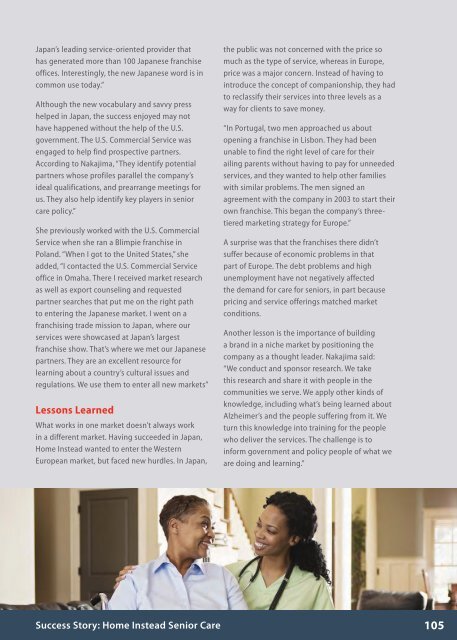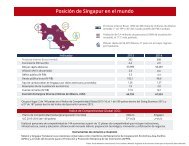basic-guide-to-exporting_Latest_eg_main_086196
basic-guide-to-exporting_Latest_eg_main_086196
basic-guide-to-exporting_Latest_eg_main_086196
Create successful ePaper yourself
Turn your PDF publications into a flip-book with our unique Google optimized e-Paper software.
Japan’s leading service-oriented provider thathas generated more than 100 Japanese franchiseoffices. Interestingly, the new Japanese word is incommon use <strong>to</strong>day.”Although the new vocabulary and savvy presshelped in Japan, the success enjoyed may nothave happened without the help of the U.S.government. The U.S. Commercial Service wasengaged <strong>to</strong> help find prospective partners.According <strong>to</strong> Nakajima, “They identify potentialpartners whose profiles parallel the company’sideal qualifications, and prearrange meetings forus. They also help identify key players in seniorcare policy.”She previously worked with the U.S. CommercialService when she ran a Blimpie franchise inPoland. “When I got <strong>to</strong> the United States,” sheadded, “I contacted the U.S. Commercial Serviceoffice in Omaha. There I received market researchas well as export counseling and requestedpartner searches that put me on the right path<strong>to</strong> entering the Japanese market. I went on afranchising trade mission <strong>to</strong> Japan, where ourservices were showcased at Japan’s largestfranchise show. That’s where we met our Japanesepartners. They are an excellent resource forlearning about a country’s cultural issues andr<strong>eg</strong>ulations. We use them <strong>to</strong> enter all new markets”Lessons LearnedWhat works in one market doesn’t always workin a different market. Having succeeded in Japan,Home Instead wanted <strong>to</strong> enter the WesternEuropean market, but faced new hurdles. In Japan,the public was not concerned with the price somuch as the type of service, whereas in Europe,price was a major concern. Instead of having <strong>to</strong>introduce the concept of companionship, they had<strong>to</strong> reclassify their services in<strong>to</strong> three levels as away for clients <strong>to</strong> save money.“In Portugal, two men approached us abou<strong>to</strong>pening a franchise in Lisbon. They had beenunable <strong>to</strong> find the right level of care for theirailing parents without having <strong>to</strong> pay for unneededservices, and they wanted <strong>to</strong> help other familieswith similar problems. The men signed anagreement with the company in 2003 <strong>to</strong> start theirown franchise. This b<strong>eg</strong>an the company’s threetieredmarketing strat<strong>eg</strong>y for Europe.”A surprise was that the franchises there didn’tsuffer because of economic problems in thatpart of Europe. The debt problems and highunemployment have not n<strong>eg</strong>atively affectedthe demand for care for seniors, in part becausepricing and service offerings matched marketconditions.Another lesson is the importance of buildinga brand in a niche market by positioning thecompany as a thought leader. Nakajima said:“We conduct and sponsor research. We takethis research and share it with people in thecommunities we serve. We apply other kinds ofknowledge, including what’s being learned aboutAlzheimer’s and the people suffering from it. Weturn this knowledge in<strong>to</strong> training for the peoplewho deliver the services. The challenge is <strong>to</strong>inform government and policy people of what weare doing and learning.”Success S<strong>to</strong>ry: Home Instead Senior Care105





